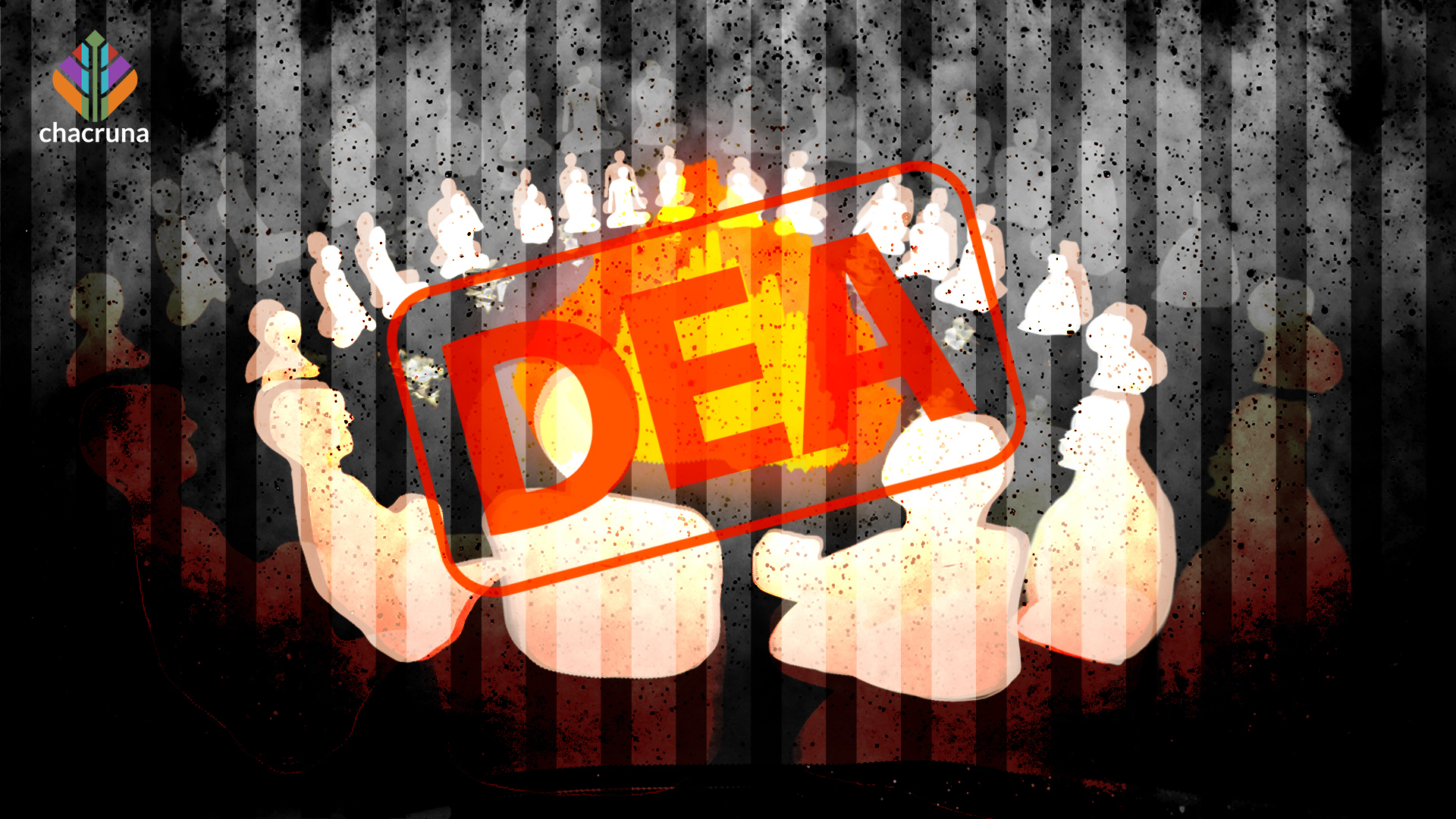- Untangling Viewpoints: Getting to Yes on the Natural Medicine Health Act - October 6, 2022
- DEA Denies Soul Quest’s Religious Exemption: Impacts on the Ayahuasca Community - June 21, 2021
- DEA and the Religious Exemption: A Fox Guarding the Henhouse - October 13, 2020
- DEA and the Religious Exemption: A Fox Guarding the Henhouse - October 13, 2020
A Critique of the DEA’s Authority over the Ceremonial Use of Controlled Substances
The plaintiffs’ organizations seek judicial relief from DEA prohibitions on controlled substances for religious exercise with ayahuasca in their churches.
On July 16, 2020, the Drug Enforcement Administration (“DEA”) announced initiation of formal rulemaking procedures necessary for adoption of regulations for processing applications for exemption from the Controlled Substances Act for religious use of controlled substances. The announcement was quiet and without fanfare, buried in a motion to stay proceedings in a lawsuit brought by the Arizona Yagé Assembly and the North American Association of Visionary Churches in the Northern District of California. (Arizona Yage Assembly et al. v. Barr, 20-cv-03098 [D. Ct. N. Dist. CA] [May 5, 2020] at Document 19-1 [Declaration of Scott A. Brinks p. 5]). The plaintiffs’ organizations seek judicial relief from DEA prohibitions on controlled substances for religious exercise with ayahuasca in their churches. Ayahuasca contains N,N-Dimethyltryptamine or DMT, a Schedule I controlled substance. The government’s response to the groups’ lawsuit was to request that the court stay proceedings and enlarge the time for response to the complaint.
Earlier in the year, another organization based in Florida, Soul Quest Church of Mother Earth, Inc., was compelled to file suit against the DEA in Federal District Court after waiting nearly three years for law enforcement to respond to its petition for registration and exemption to Controlled Substance Act prohibitions for religious exercise with Ayahuasca. (Soul Quest Church of Mother Earth, Inc. v. Barr, 20-cv-00701-WWB-DCI [D. Ct. Middle Dist. FL] [April 22, 2020]).
In response to pressure exerted by these lawsuits and recent executive orders mandating increased transparency in use of agency guidance documents,[1] the DEA determined it necessary to proceed with formal rulemaking, stating that law enforcement was “actively engaged in updating and revising the DEA’s existing regulations to incorporate consideration of issues arising under the Religious Freedom Restoration Act and to lay out the procedures by which applications for religious exemptions are to be handled.” (See Arizona Yage Assembly et al. v. Barr, 20-cv-03098 [D. Ct. N. Dist. CA] [May 5, 2020] at Document 19-1 [Declaration of Scott A. Brinks p. 5]). According to the agency, the DEA’s new regulations, when adopted and implemented, would serve to supersede the DEA’s Guidance Regarding Petitions for Religious Exemption from the Controlled Substances Act Pursuant to the Religious Freedom Restoration Act (“DEA’s RFRA Guidance”).

The UDV claimed the Controlled Substances Act, a law which prohibits the possession and trafficking of virtually all forms of naturally occurring “hallucinogens,” was a substantial burden to their religious exercise under the Religious Freedom Restoration Act, providing that the government may not substantially burden religious exercise “to the person” unless it can prove that such burden is narrowly tailored to achieve a compelling state interest.
History of the DEA’s RFRA Guidance
In the watershed case, Gonzales v. O Centro Espírita Beneficente União Do Vegetal, the plaintiff, O Centro Espírita Beneficente União Do Vegetal (“UDV”), won an exemption from the Controlled Substances Act to drink hoasca, a substance containing Dimethyltryptamine (“DMT”) in substantially identical form as the tea known as “ayahuasca” or “yagé.” The UDV claimed the Controlled Substances Act, a law which prohibits the possession and trafficking of virtually all forms of naturally occurring “hallucinogens,” was a substantial burden to their religious exercise under the Religious Freedom Restoration Act, providing that the government may not substantially burden religious exercise “to the person” unless it can prove that such burden is narrowly tailored to achieve a compelling state interest. The U.S. Supreme Court held that the government failed to carry its burden that the strict and total prohibition of DMT as applied to religious exercise with hoasca is the most narrowly tailored method to keep the public safe and prevent diversion of ayahuasca to non-religious uses (546 U.S. 418 [2006]).
A similar result was reached in a sister case in the Federal District of Oregon (See Church of the Holy Light of the Queen v. Mukasey, 615 F.Supp.2d 1210 [D.Or. 2009]). Notably, the question of whether these two groups were sufficiently religious enough to warrant Religious Freedom Restoration Act protection was not at issue. The government stipulated that these groups were, in fact, engaged in the exercise of religion at the outset.
The guidance mandates that religious groups submit a petition to law enforcement with “detailed information” regarding practitioners’ religious activities with controlled substances.
In 2009, and in the wake of the government’s losses in these two cases, the DEA posted a two-page document online, titled, “Guidance Regarding Petitions for Religious Exemption from the Controlled Substances Act Pursuant to the Religious Freedom Restoration Act” (“DEA’s RFRA Guidance”). The DEA’s RFRA Guidance was held out as an “interim measure intended to provide guidance to parties who wish to petition for a religious exemption to the CSA.” The guidance mandates that religious groups submit a petition to law enforcement with “detailed information” regarding practitioners’ religious activities with controlled substances. Successful petitioners receive a “DEA Certificate of Registration.” The DEA’s RFRA Guidance essentially serves as law enforcement’s Rorschach test for deciding whether or not a group or organization’s “religious exercise” with a particular controlled substance warrants a religious exemption to the federal Controlled Substances Act.
Rather, the DEA, on two occasions in 2008 and 2009, used the petitioning and registration process established under the guidance to question the religious sincerity of organizations using Cannabis as part of their religious exercise and deny the requested religious exemptions
The DEA’s RFRA Guidance: Law Enforcement’s Problem Child
Unsurprisingly, after a decade-and-a-half of usage by federal law enforcement, the DEA’s RFRA Guidance has failed to result in registration of a single religious adherent or the granting of a religious exemption to CSA prohibitions. Rather, the DEA, on two occasions in 2008 and 2009, used the petitioning and registration process established under the guidance to question the religious sincerity of organizations using Cannabis as part of their religious exercise and deny the requested religious exemptions (See Letter from Joseph T. Rannazzisi, Deputy Assistant Administrator, Office of Diversion Control, U.S. Department of Justice, Drug Enforcement Administration to Marc Perkel, Founder of the Church of Reality [October 1, 2008]; and, Letter from Joseph T. Rannazzisi, Deputy Assistant Administrator, Office of Diversion Control, U.S. Department of Justice, Drug Enforcement Administration to Mr. Ronald Steven Mintz, Attorney for the Nation of the Living God [July 2, 2009]).
The DEA’s decisions lay bare one of the foundational problems with the agency’s petition and registration process: law enforcement’s willingness to second-guess the reasonableness of religious exercise with controlled substances. Compare Federal Law Protections for Religious Liberty, U.S. Attorney General Jeff Sessions, October 6, 2017, at 4 (“religious adherents will often be required to draw lines in the application of their religious beliefs, and government is not competent to assess the reasonableness of such lines drawn, nor would it be appropriate for the government to do so.”).
While seemingly straightforward on its face, the DEA’s RFRA Guidance fails to articulate a legal standard governing law enforcement’s review of petitions, impose a time frame for agency decision-making, or delineate judicial remedies. It also leaves petitioners vulnerable to criminal sanctions by exposing themselves to law enforcement scrutiny and potentially forfeiting Fifth Amendment rights. Further, the guidance fails to identify legal authority articulating law enforcement’s ability to register religious activity, which is especially critical where, as here, the enforceability of DEA’s RFRA Guidance has been called into question (SeeThe U.S. Drug Enforcement Administration Problematic Process for Religious Exemption for Use of Prohibited Psychoactive Substances by Brad Bartlett, Esq. [July 16, 2019]).

The DEA in Charge of the Religious Exemption: A Fox Guarding the Henhouse
The DEA’s rulemaking announcement in the Arizona Yagé Assembly case raises an important legal question:
Does DEA have authority to require religious adherents to petition and register with the federal government in order to seek religious exemption from CSA prohibitions?
Does DEA have authority to require religious adherents to petition and register with the federal government in order to seek religious exemption from CSA prohibitions?
As set forward here, the DEA lacks such authority. Historically speaking, Congress has been reluctant to grant federal agencies the power to administratively adjudicate religious exercise claims, except in exceedingly rare circumstances, such as the granting of exemptions to combat training and service in the armed forces for conscientious objectors (50 U.S.C. §456[j]).
Exemplifying Congress’ restraint in empowering government agencies to judge religiosity, even the Internal Revenue Service’s (“IRS”) power over religious activity is extremely circumscribed. Unlike other charitable organizations, churches are not required to submit to the government’s scrutiny over religiosity in order to be tax exempt. Churches are automatically tax exempt. Churches may choose to submit to this formal inquiry process if they wish to obtain official recognition of their tax-exempt status from the IRS in order to assure donors that their donations are tax deductible. But submission of the Form 1023 is not required to be a recognized church in America.
As if to punctuate the importance of government non-interference in religious affairs, Congress further restrained the IRS’ power to investigate church activities—a status no other type of entity in the country enjoys. From the IRS’ own website (September 2020):
Congress has imposed special limitations, found in section 7611 of the Internal Revenue Code, on how and when the IRS may conduct civil tax inquiries and examinations of churches. The IRS may begin a church tax inquiry only if an appropriate high-level Treasury official reasonably believes, on the basis of facts and circumstances recorded in writing, that an organization claiming to be a church or convention or association of churches may not qualify for exemption.
Any rulemaking conducted by the DEA with respect to the religious use of ayahuasca or other controlled substances must comply with the Administrative Procedure Act. Under Section 553 of the Administrative Procedure Act, the DEA must reference the legal authority under which the rule is to be imposed (5. U.S.C. §553[b][2]). However, in this case, there is no legal authority enabling the continuation of the agency’s petitioning and registration process for religious exercise, nor allowing new rules to be propogated pertaining to religious exercise. In order to engage in its intended rulemaking, the DEA must violate its own enabling statute as well as the APA.
Generally speaking, the authority to regulate rests with Congress and is delegated, through law, to an agency. The statutory basis for a regulation can vary greatly in terms of its specificity, from a) very broad grants of authority that state only the general intent of the legislation and leave agencies with a great deal of discretion as to how that intent should be implemented, to b) very specific requirements delineating exactly what regulatory agencies should do and how they should take action.
RFRA clearly prohibits federal law enforcement agencies like the DEA from substantially burdening the exercise of religion, which is defined broadly to include “any exercise of religion, whether or not compelled by, or central to, a system of religious belief”
In the case of religious exercise with controlled substances like ayahuasca, the Religious Freedom Restoration Act (“RFRA”) mandates that the “government shall not substantially burden a person’s exercise of religion even if the burden results from a rule of general applicability” (42 U.S.C. § 2000bb–1[a]). RFRA clearly prohibits federal law enforcement agencies like the DEA from substantially burdening the exercise of religion, which is defined broadly to include “any exercise of religion, whether or not compelled by, or central to, a system of religious belief” (42 USC § 2000bb-2[4]). (emphasis added).
However, while RFRA’s protections on the exercise of religion are imposed on all federal agencies, RFRA itself does not empower federal agencies like the DEA to administratively process RFRA claims and, in particular, the statute does not delegate petitioning and registration authority to DEA for religious exercise with controlled substances. Instead, the only mechanism provided by Congress for addressing burdens to religious exercise is through judicial relief in federal court (42 U.S.C. § 2000bb–1[c]).
In looking elsewhere for a grant of authority by Congress to the DEA to administratively process RFRA claims, we look to the DEA’s enabling act, the Controlled Substance Act (“CSA”). In passing the CSA, Congress empowered the DEA to grant exemptions to CSA’s strict prohibitions on “hallucinogenic” substances, utilizing a registration process for the manufacture, distribution, and dispensing of controlled substances (21 U.S.C. §823). Critically, Congress only authorized the DEA to register applicants engaged in “legitimate medical, scientific, research, and industrial purposes” (21 U.S.C. §823). Congress did not delegate to DEA the authority to register religious activities, nor did Congress give DEA authority to require religious practitioners to petition DEA for administrative relief prior to seeking judicial relief under RFRA.
Further, and while the DEA’s own regulations implementing the CSA allow that “any person may apply for an exception to the application of any provision of this chapter,” the agency’s “discretion” to grant such an exception is constrained by and limited to the CSA (21 C.F.R. §1307.03). Therefore, and by their own terms, the DEA’s implementing regulations do not and arguably cannot recognize the free exercise of religion as a legitimate “exemption” to DEA prohibitions on controlled substances (21 C.F.R. §1307.03). This interpretation is consistent with prior agency positions on religious exercise.
Prior to promulgation of the DEA’s RFRA Guidance, the DEA itself took the position that the agency does not have inherent authority to make religious exemptions to the statute (see,e.g., Olsen v. DEA, 878 F.2d 1458, 1460 [D.C. Cir. 1989]) (“according to the DEA, Congress intended no religious-use exemption from Controlled Substances Act proscriptions other than the peyote-use permission granted the Native American Church.”) (Olsen v. DEA, 878 F.2d 1460 [D.C. Cir. 1989]). Sidestepping a final ruling on whether the DEA had such authority, late Justice Ginsberg said, “We recognize that even if the DEA were not empowered or obliged to act (to exempt the plaintiff’s religious use of cannabis), Olsen would be entitled to a judicial audience.” (Olsen v. DEA, 878 F.2d 1461 [D.C. Cir. 1989]). Importantly, Justice Ginsberg then assumed the plaintiff’s belief was sincere and that the government’s action substantially burdened that belief—a methodology that has since become the norm in RFRA cases (cf. Burwell v. Hobby Lobby Stores, Inc., 573 U.S. 682 [2014]).
In closing, Congress simply has not provided the DEA the authority to require religious adherents to petition and register with law enforcement for religious exercise with controlled substances. For this reason, any DEA rulemaking requiring religious adherents to petition and register with DEA for an exemption to CSA prohibitions on controlled substances is likely to run afoul of RFRA. RFRA’s sparse language only provided for the remedy of RFRA claims in judicial proceedings, not beforeagency actors, like the DEA, whose prohibitions may be in violation of RFRA’s requirements (42 U.S.C. § 2000bb–1[c]).
While a meaningful approach to a religious exemption from the CSA would be welcomed by religious practitioners utilizing substances like ayahuasca, Congress has not provided the DEA the legal authority to require religious adherents to petition and register with law enforcement for religious exercise with controlled substances. The DEA cannot conjure such authority out of thin air where none was intended expressly or impliedly by Congressional action when it passed RFRA.
Art by Mariom Luna.
[1] See Promoting the Rule of Law Through Improved Agency Guidance Documents, Exec. Order No. 13,891, 84 Fed. Reg. 55,235 (October 15, 2019); and Promoting the Rule of Law Through Transparency and Fairness in Civil Administrative Enforcement and Adjudication, Exec. Order No. 13,892, 84 Fed. Reg. 55,239 (October 15, 2019).
Take a minute to browse our stock:
Did you enjoy reading this article?
Please support Chacruna's work by donating to us. We are an independent organization and we offer free education and advocacy for psychedelic plant medicines. We are a team of dedicated volunteers!
Can you help Chacruna advance cultural understanding around these substances?














